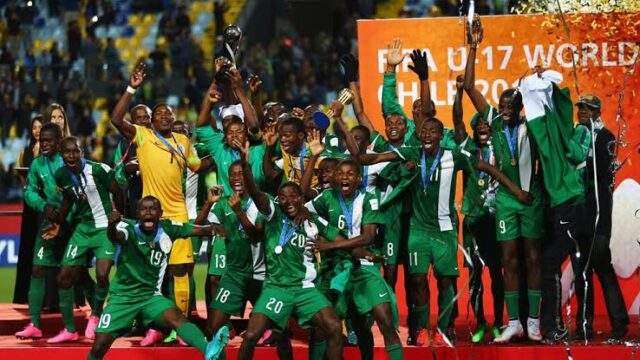For the first time in the expanded history of the FIFA U-17 World Cup, ten teams from Africa will participate on the global stage, thanks to the new format that welcomes 48 nations to Qatar in November 2025.
Read Also: Meet the Nigerian Goalkeeper Dominating League One: Arthur Okonkwo Keeps a Record 17 Clean Sheets
While this development is a major step forward for African football, it has also reignited a pressing debate: the structure of CAF’s qualification system for the U-17 category.
Despite being the most successful nation in the tournament’s history, five-time world champions Nigeria will not be among Africa’s representatives this year.
Alongside Ghana—another traditional powerhouse that has reached multiple U-17 World Cup finals—Nigeria’s absence raises questions about the fairness and effectiveness of the current qualification structure after CAF failed to extend wild card to Nigeria which finished third position in the WAFU B qualifiers.
Africa’s ten representatives—Egypt, Uganda, Burkina Faso, Côte d’Ivoire, Mali, Morocco, Senegal, South Africa, Tunisia, and Zambia—earned their tickets through the TotalEnergies CAF U-17 Africa Cup of Nations (AFCON) and its play-offs.
Uganda made history by qualifying for their first-ever World Cup after a comeback win over The Gambia, while hosts Egypt overcame Angola in a hard-fought match.
The remaining eight teams had already secured their spots by progressing to the knockout stages of the U-17 AFCON, showcasing depth and emerging talent across the continent.
However, the regional qualification system that determines the lineup for the U-17 AFCON is increasingly being called into question.
Currently, CAF uses a zonal approach, dividing qualification slots among its regional federations.
In particular, the WAFU Zone B, which includes both Nigeria and Ghana, receives only two slots despite historically being the continent’s most dominant region at the global level.
This restriction meant that both countries, despite their pedigree, failed to qualify for the tournament, and in turn, the World Cup.
The argument is simple: any qualification system that fails to include Africa’s historically best performers, especially with ten available slots—is flawed.
There is a growing call for CAF to either increase the slots for stronger zones like WAFU B (as the battle for the two slots is becoming fierce while other less competitive regions gets higher slots) or abandon the regional qualification system altogether in favor of a more open, merit-based structure.
Since Nigeria’s last U-17 World Cup triumph in 2015, no African country has managed to lift the trophy. With the continent now given more opportunities than ever to showcase its talent on the global stage, it is imperative that CAF ensures its best representatives make it through.
The expanded tournament should be a chance for African excellence to shine, not a reminder of how structural limitations can sideline the continent’s finest.
As CAF wraps up qualification for Qatar 2025 intensify, CAF must take a hard look at how it selects its representatives, because any selection process that stifled out it’s besr region with the best pedigree at the World Cup is seriously flawed as the West Africa region has always known to be a power house of cadet football and WAFU B in particular.









